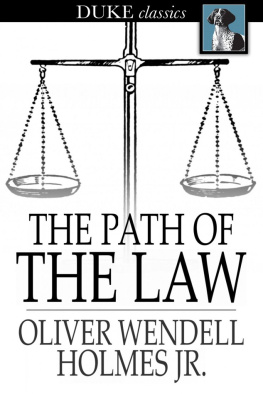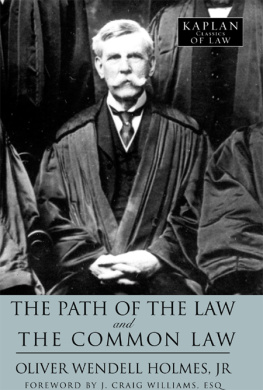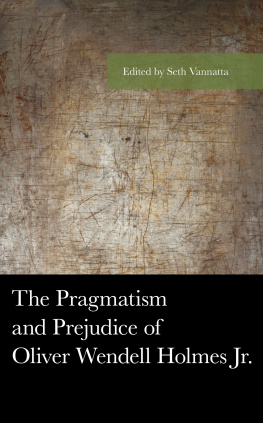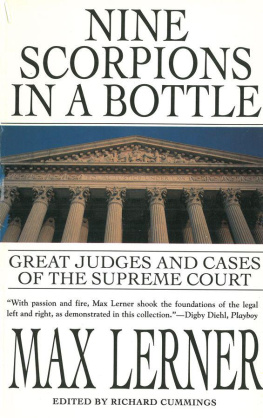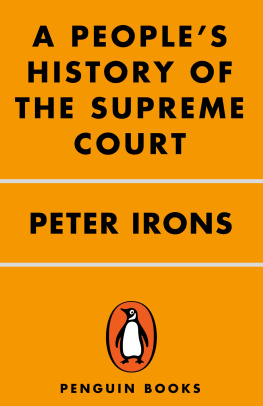Oliver Wendell Holmes - The Path of the Law
Here you can read online Oliver Wendell Holmes - The Path of the Law full text of the book (entire story) in english for free. Download pdf and epub, get meaning, cover and reviews about this ebook. year: 2015, publisher: Duke Classics, genre: Science. Description of the work, (preface) as well as reviews are available. Best literature library LitArk.com created for fans of good reading and offers a wide selection of genres:
Romance novel
Science fiction
Adventure
Detective
Science
History
Home and family
Prose
Art
Politics
Computer
Non-fiction
Religion
Business
Children
Humor
Choose a favorite category and find really read worthwhile books. Enjoy immersion in the world of imagination, feel the emotions of the characters or learn something new for yourself, make an fascinating discovery.
- Book:The Path of the Law
- Author:
- Publisher:Duke Classics
- Genre:
- Year:2015
- Rating:5 / 5
- Favourites:Add to favourites
- Your mark:
- 100
- 1
- 2
- 3
- 4
- 5
The Path of the Law: summary, description and annotation
We offer to read an annotation, description, summary or preface (depends on what the author of the book "The Path of the Law" wrote himself). If you haven't found the necessary information about the book — write in the comments, we will try to find it.
The Path of the Law — read online for free the complete book (whole text) full work
Below is the text of the book, divided by pages. System saving the place of the last page read, allows you to conveniently read the book "The Path of the Law" online for free, without having to search again every time where you left off. Put a bookmark, and you can go to the page where you finished reading at any time.
Font size:
Interval:
Bookmark:

First published in 1897
ISBN 978-1-62011-234-2
Duke Classics
2012 Duke Classics and its licensors. All rights reserved.
While every effort has been used to ensure the accuracy and reliability of the information contained in this edition, Duke Classics does not assume liability or responsibility for any errors or omissions in this book. Duke Classics does not accept responsibility for loss suffered as a result of reliance upon the accuracy or currency of information contained in this book.
10 HARVARD LAW REVIEW 457 (1897)
When we study law we are not studying a mystery but a well-knownprofession. We are studying what we shall want in order to appear beforejudges, or to advise people in such a way as to keep them out of court.The reason why it is a profession, why people will pay lawyers to arguefor them or to advise them, is that in societies like ours the commandof the public force is intrusted to the judges in certain cases, and thewhole power of the state will be put forth, if necessary, to carryout their judgments and decrees. People want to know under whatcircumstances and how far they will run the risk of coming against whatis so much stronger than themselves, and hence it becomes a businessto find out when this danger is to be feared. The object of our study,then, is prediction, the prediction of the incidence of the public forcethrough the instrumentality of the courts.
The means of the study are a body of reports, of treatises, and ofstatutes, in this country and in England, extending back for six hundredyears, and now increasing annually by hundreds. In these sibyllineleaves are gathered the scattered prophecies of the past upon the casesin which the axe will fall. These are what properly have been called theoracles of the law. Far the most important and pretty nearly the wholemeaning of every new effort of legal thought is to make these propheciesmore precise, and to generalize them into a thoroughly connected system.The process is one, from a lawyer's statement of a case, eliminatingas it does all the dramatic elements with which his client's story hasclothed it, and retaining only the facts of legal import, up to thefinal analyses and abstract universals of theoretic jurisprudence. Thereason why a lawyer does not mention that his client wore a white hatwhen he made a contract, while Mrs. Quickly would be sure to dwell uponit along with the parcel gilt goblet and the sea-coal fire, is that heforesees that the public force will act in the same way whatever hisclient had upon his head. It is to make the prophecies easier to beremembered and to be understood that the teachings of the decisions ofthe past are put into general propositions and gathered into textbooks,or that statutes are passed in a general form. The primary rights andduties with which jurisprudence busies itself again are nothing butprophecies. One of the many evil effects of the confusion between legaland moral ideas, about which I shall have something to say in a moment,is that theory is apt to get the cart before the horse, and consider theright or the duty as something existing apart from and independent ofthe consequences of its breach, to which certain sanctions are addedafterward. But, as I shall try to show, a legal duty so called isnothing but a prediction that if a man does or omits certain things hewill be made to suffer in this or that way by judgment of the court; andso of a legal right.
The number of our predictions when generalized and reduced to a systemis not unmanageably large. They present themselves as a finite bodyof dogma which may be mastered within a reasonable time. It is a greatmistake to be frightened by the ever-increasing number of reports. Thereports of a given jurisdiction in the course of a generation take uppretty much the whole body of the law, and restate it from the presentpoint of view. We could reconstruct the corpus from them if all thatwent before were burned. The use of the earlier reports is mainlyhistorical, a use about which I shall have something to say before Ihave finished.
I wish, if I can, to lay down some first principles for the study ofthis body of dogma or systematized prediction which we call the law,for men who want to use it as the instrument of their business to enablethem to prophesy in their turn, and, as bearing upon the study, I wishto point out an ideal which as yet our law has not attained.
The first thing for a businesslike understanding of the matter is tounderstand its limits, and therefore I think it desirable at onceto point out and dispel a confusion between morality and law, whichsometimes rises to the height of conscious theory, and more often andindeed constantly is making trouble in detail without reaching the pointof consciousness. You can see very plainly that a bad man has as muchreason as a good one for wishing to avoid an encounter with the publicforce, and therefore you can see the practical importance of thedistinction between morality and law. A man who cares nothing for anethical rule which is believed and practised by his neighbors is likelynevertheless to care a good deal to avoid being made to pay money, andwill want to keep out of jail if he can.
I take it for granted that no hearer of mine will misinterpret whatI have to say as the language of cynicism. The law is the witness andexternal deposit of our moral life. Its history is the history of themoral development of the race. The practice of it, in spite of popularjests, tends to make good citizens and good men. When I emphasize thedifference between law and morals I do so with reference to a singleend, that of learning and understanding the law. For that purpose youmust definitely master its specific marks, and it is for that that Iask you for the moment to imagine yourselves indifferent to other andgreater things.
I do not say that there is not a wider point of view from whichthe distinction between law and morals becomes of secondary or noimportance, as all mathematical distinctions vanish in presence of theinfinite. But I do say that that distinction is of the first importancefor the object which we are here to considera right study and masteryof the law as a business with well understood limits, a body of dogmaenclosed within definite lines. I have just shown the practical reasonfor saying so. If you want to know the law and nothing else, you mustlook at it as a bad man, who cares only for the material consequenceswhich such knowledge enables him to predict, not as a good one, whofinds his reasons for conduct, whether inside the law or outside of it,in the vaguer sanctions of conscience. The theoretical importance of thedistinction is no less, if you would reason on your subject aright. Thelaw is full of phraseology drawn from morals, and by the mere force oflanguage continually invites us to pass from one domain to the otherwithout perceiving it, as we are sure to do unless we have the boundaryconstantly before our minds. The law talks about rights, and duties, andmalice, and intent, and negligence, and so forth, and nothing is easier,or, I may say, more common in legal reasoning, than to take these wordsin their moral sense, at some state of the argument, and so to drop intofallacy. For instance, when we speak of the rights of man in a moralsense, we mean to mark the limits of interference with individualfreedom which we think are prescribed by conscience, or by our ideal,however reached. Yet it is certain that many laws have been enforcedin the past, and it is likely that some are enforced now, which arecondemned by the most enlightened opinion of the time, or which at allevents pass the limit of interference, as many consciences would drawit. Manifestly, therefore, nothing but confusion of thought can resultfrom assuming that the rights of man in a moral sense are equallyrights in the sense of the Constitution and the law. No doubt simpleand extreme cases can be put of imaginable laws which the statute-makingpower would not dare to enact, even in the absence of writtenconstitutional prohibitions, because the community would rise inrebellion and fight; and this gives some plausibility to the propositionthat the law, if not a part of morality, is limited by it. But thislimit of power is not coextensive with any system of morals. For themost part it falls far within the lines of any such system, and in somecases may extend beyond them, for reasons drawn from the habits of aparticular people at a particular time. I once heard the late ProfessorAgassiz say that a German population would rise if you added two centsto the price of a glass of beer. A statute in such a case would be emptywords, not because it was wrong, but because it could not be enforced.No one will deny that wrong statutes can be and are enforced, and wewould not all agree as to which were the wrong ones.
Font size:
Interval:
Bookmark:
Similar books «The Path of the Law»
Look at similar books to The Path of the Law. We have selected literature similar in name and meaning in the hope of providing readers with more options to find new, interesting, not yet read works.
Discussion, reviews of the book The Path of the Law and just readers' own opinions. Leave your comments, write what you think about the work, its meaning or the main characters. Specify what exactly you liked and what you didn't like, and why you think so.

